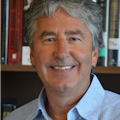Gerald Joyce, M.D., Ph.D.
Professor, Skirball Center for Chemical Biology and Proteomics, Salk InstituteGerald Joyce’s website
SCOL Project: Self-Sustained Evolution of RNA
It is generally thought that all existing life on Earth was preceded by a simpler form of life, based on RNA rather than DNA and protein. In this prior “RNA world,” the genetic material consisted of RNA molecules that were replicated by RNA enzymes (ribozymes). We are developing ribozymes that catalyze the replication of RNA molecules, ultimately including the production of additional copies of themselves. Such a chemical system could undergo Darwinian evolution in a self-sustained manner, providing a laboratory recreation of RNA-based life. We use evolution itself as a technique to develop these ribozymes, “breeding” RNA molecules in the test tube for traits that enable faster, more accurate and more general copying of RNA.
Our best ribozymes can copy other ribozymes and can exponentially amplify short RNA molecules, but cannot copy themselves. We continue to improve their activity and sequence generality using a variety of directed evolution approaches. A new strategy that we have adopted is to break the ribozymes into shorter fragments that are more readily copied and that can assemble spontaneously to form a functional replicator. We also are developing ribozymes that copy RNA molecules to complementary DNA molecules and copy those DNA molecules back to RNA. These activities are likely to have arisen during the early history of life on Earth and would have enabled the transition from RNA to DNA genomes. DNA is much more stable than RNA, thus providing a larger and more secure repository for genetic information, as required for the emergence of modern cellular organisms.
Bio:
Gerald F. Joyce is a professor in the Jack H. Skirball Center for Chemical Biology and Proteomics at the Salk Institute in La Jolla, California. He also is institute director of the Genomics Institute of the Novartis Research Foundation (GNF). He received his B.A. from the University of Chicago in 1978 and both an M.D. and a Ph.D. from the University of California, San Diego in 1984. He carried out postgraduate medical training at Scripps Mercy Hospital in San Diego and postdoctoral research training at the Salk Institute before joining the faculty of the The Scripps Research Institute in 1989. In 2017 he moved his laboratory to the Salk Institute.
Dr. Joyce’s research involves the test-tube evolution of nucleic acids and the application of these methods to the development of novel RNA and DNA enzymes. He also has a longstanding interest in the origins of life and the role of RNA in the early history of life on Earth. His laboratory described the first example, outside of biology, of a self-replicating molecule that is capable of undergoing Darwinian evolution. More recently, it developed an RNA enzyme that can synthesize a complex, functional RNAs and catalyze the exponential amplification of short RNAs.
Dr. Joyce has published over 150 scientific papers and is the inventor of 11 issued patents. He is a member of the U.S. National Academy of Sciences, the U.S. National Academy of Medicine and the American Academy of Arts and Sciences. In 2005 he received the H.C. Urey Award, presented every six years by the International Society for the Study of the Origin of Life; in 2009 he received the Dannie Heineman Prize, presented every two years by the Göttingen Academy of Sciences; and in 2010 he received the U.S. National Academy of Sciences’ Stanley Miller Medal, presented every five years in association with the Award in Early Earth and Life Sciences. Dr. Joyce has lectured extensively around the world, including at the Pontifical Academy and the Royal Swedish Academy of Sciences.